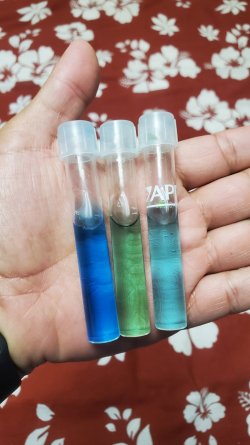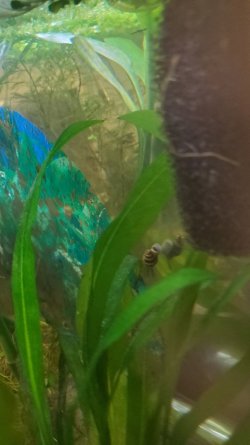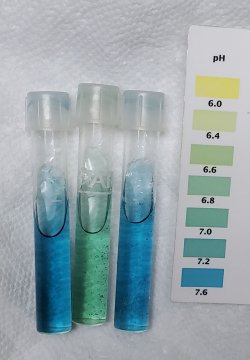You are using an out of date browser. It may not display this or other websites correctly.
You should upgrade or use an alternative browser.
You should upgrade or use an alternative browser.
Increased water pH shenanigans continues unabated
- Thread starter outofwater
- Start date
The April FOTM Contest Poll is open!

🏆 Click to vote! 🏆
outofwater
Fish Addict
You're right, it's pH. KH increases here in the summer months, and the water company report indicates they aim for a pH of 9.
A high PH doesn't mean your water is hard It is possible to have a PH of 6 with very hard water. A PH of 9 indicates the water utility is adding something to the water to increase ph. GH (General hardness) test only tests for the presence of calcium and magnesium. The PH test test for the presence of acids nd bases. The PH test doesn't detect calcium and magnesium. The KH test detects carbonates. this carbonates may or may not have calcium and magnesium. So a KH test also des not detect hardness.
Can you write to your water company and ask them why they increase the pH to 9?You're right, it's pH. KH increases here in the summer months, and the water company report indicates they aim for a pH of 9.
Tell them it is caustic and doesn't need to be that high. Tell them it hurts your stomach when you drink tap water. Ask them to keep it below 8.0.
There is absolutely no reason at all for the pH of tap water to be above 8.0, and 9.0 is dangerous and bad for you because it reacts with the stomach acids.
Household bleach has a pH around 11, which is only 2 points above your tap water, and bleach dissolves organic matter like skin.
outofwater
Fish Addict
I think you had commented on a related thread I had posted. Although I'm a bit more familiar with these terms now (by having to read and learn about this so I can give my fish the best environment I can provide) I still can't answer what changed or when exactly it happened, but it did. I started my first tank back in December and I had no issues with the tap water back then. The only reason I tested for pH again was because when I tried to add more ottos a few weeks ago, they all died basically right away and the guy at the lfs tested my water and said pH was off the roof. I then went down that rabbit hole and confirmed that indeed, the water coming off the tap has a pH that's literally off the api color chart.A high PH doesn't mean your water is hard It is possible to have a PH of 6 with very hard water. A PH of 9 indicates the water utility is adding something to the water to increase ph. GH (General hardness) test only tests for the presence of calcium and magnesium. The PH test test for the presence of acids nd bases. The PH test doesn't detect calcium and magnesium. The KH test detects carbonates. this carbonates may or may not have calcium and magnesium. So a KH test also des not detect hardness.
This below is from that thread, and the results today are the same as back then, using test stripes:
All 3 tanks show 30 and 80 for GH and KH, respectively.
Off the tap: somewhere between 30 and 60 for GH, and between 80 and 120 for KH.
Off the tap, brita-filtered: GH at 30, KH between 40 and 80.
How do freshwater fresh manage to survive in a tank with a pH of 9? I'm not being smart; can someone enlighten me please. It makes no sense in my brain
outofwater
Fish Addict
This is their explanation:Can you write to your water company and ask them why they increase the pH to 9?
Tell them it is caustic and doesn't need to be that high. Tell them it hurts your stomach when you drink tap water. Ask them to keep it below 8.0.
There is absolutely no reason at all for the pH of tap water to be above 8.0, and 9.0 is dangerous and bad for you because it reacts with the stomach acids.
Household bleach has a pH around 11, which is only 2 points above your tap water, and bleach dissolves organic matter like skin.
Treated Water - pH and Alkalinity Compliance
MWRA adjusts the alkalinity and pH of Wachusett water at CWTP to reduce its corrosivity, which minimizes the leaching of
lead and copper from service lines and home plumbing systems into the water. MWRA’s target for distribution system pH
is 9.3; the target for alkalinity is 40 mg/L
Byron had pointed out that where he lives, they achieved their desired pH levels by adding carbonate. I presume they use the same method where i live, and from what I heard with the guy at the lfs it is a "seasonal" thing they do in the summer months, however the website had reports going back to January and they're almost identical, and the paragraph above (about pH and alkalinity goals and their reasoning behind them) is virtually unchanged. This adds to my confusion and frustration, as I was testing for pH, ammonia nitrites and nitrates on a weekly basis well into Spring because I was just starting and was paranoid about the water details for my first tank
Last edited:
Your water company is run by morons. They don't need to keep the pH that high to stop the pipes being damaged. Our pH is around 7.6-8.0 and our pipes are fine. Most other places around the world have a pH around 8.0 or slightly below. I have only heard of 2 other people who had a high pH like you and they all had problems keeping tetras and other fish that liked soft acid water.
The seasonal pH fluctuations (as suggested by the local fish shop) is probably from the water company using different water sources and adding more chlorine due to the hot weather.
Maybe contact your local member of parliament and see if they can get the water company to reduce the pH to a more normal level (around 7.5-8.0) like it is in the rest of the world.
Until then your best bet is a solar distillation unit or reverse osmosis. Then add some minerals like a Rift Lake water conditioner to increase the GH and KH up to where you need it.
The seasonal pH fluctuations (as suggested by the local fish shop) is probably from the water company using different water sources and adding more chlorine due to the hot weather.
Maybe contact your local member of parliament and see if they can get the water company to reduce the pH to a more normal level (around 7.5-8.0) like it is in the rest of the world.
Until then your best bet is a solar distillation unit or reverse osmosis. Then add some minerals like a Rift Lake water conditioner to increase the GH and KH up to where you need it.
Evolution. A number of freshwater fishes evolved from marine fish and they originally did better in hard water with a high pH. Australian and New Guinea rainbowfish fall into this category. Other fish were thrown into an environment with a high pH and simply adapted or died. Most die but occasionally some survive and they pass on their genes and you get a new type of fish.How do freshwater fresh manage to survive in a tank with a pH of 9? I'm not being smart; can someone enlighten me please. It makes no sense in my brain
Places like Africa's Rift Lakes would have originally had softer water with a lower pH, but due to evaporation and heaps of limestone, the GH, KH & pH has gradually increased over thousands of years.
There is a river in the northern part of Australia and it had rainbowfish in. A mining company poisoned the water with copper and other chemicals and wiped everything out. A few years later they found the same species of rainbowfish there but it had changed slightly and now had bigger kidneys. A few fish appear to have survived and developed bigger kidneys to deal with the toxins in the water.
Evolution, adapt or die.
The fish you are talking about aren't your normal barbs or tetras, what about them?Evolution. A number of freshwater fishes evolved from marine fish and they originally did better in hard water with a high pH. Australian and New Guinea rainbowfish fall into this category. Other fish were thrown into an environment with a high pH and simply adapted or died. Most die but occasionally some survive and they pass on their genes and you get a new type of fish.
Places like Africa's Rift Lakes would have originally had softer water with a lower pH, but due to evaporation and heaps of limestone, the GH, KH & pH has gradually increased over thousands of years.
There is a river in the northern part of Australia and it had rainbowfish in. A mining company poisoned the water with copper and other chemicals and wiped everything out. A few years later they found the same species of rainbowfish there but it had changed slightly and now had bigger kidneys. A few fish appear to have survived and developed bigger kidneys to deal with the toxins in the water.
Evolution, adapt or die.
What fish are you wanting to keep in this tank?
outofwater
Fish Addict
This is my tank that's been running for 8 months now. I have 3 tanks totalWhat fish are you wanting to keep in this tank?
a) 29g, 5 cories, 2 ottos, 13 neon tetras, 1 nerite and 2 mystery snails. Plan to move them to a 55g next year
b) 10g, 1 dwarf gourami, 1 nerite and 1 mystery snails
c) 10g quarantine/planting tank. 1 hitchhiker guppy fry, when I got the additional ottos he hitched a ride (3 ottos, out of which unfortunately only 1 survived, he's in the 29g now)
Plan to shut down the quarantine tank in the coming weeks, transfer the guppy to the main tank, move the plants to the other 2 tanks. Next year I'll add more fish, but I want to move out of this place then, so I don't want to set up the bigger tank or keep 3 tanks running until then.
Attachments
Last edited:
outofwater
Fish Addict
The plants in the 29g REALLY seem to help. The quarantine tank has plenty of plants for its size, and sand. The gourami tank has a decent amount of plants and gravel for substrate. Yet those 2 tanks have a harder water (left and right on this picture), almost identical in reading;compared to the 29g one, at the center.
Attachments
Latest Discussions
- Replies
- 6
- Views
- 85
trending
-
-
-
-
-
F-1 Angel... a bit nervous... it'll be my 1st F-1 fish...
- Started by Magnum Man
- Replies: 17





